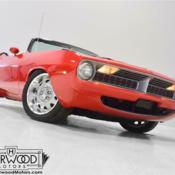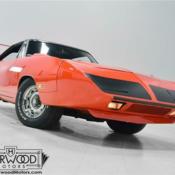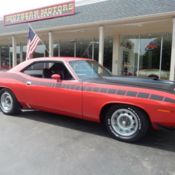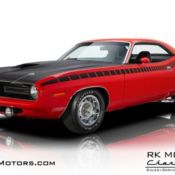1970 Plymouth Cuda 440+6 84414 Miles Rallye Red 440 cubic inch V8 3-speed auto
Technical specifications of Plymouth Cuda 440+6 1970
| Price: | US $74,900.00 |
|---|---|
| Condition: | Used |
| Item location: | Local pick-up only |
| Make: | Plymouth |
| Model: | Cuda 440+6 |
| Type: | -- |
| Trim: | -- |
| Year: | 1970 |
| Mileage: | 84414 |
| VIN: | BS23V0B266658 |
| Color: | Red |
| Engine size: | 440 cubic inch V8 |
| Power options: | -- |
| Fuel: | Gasoline |
| Transmission: | Automatic |
| Drive type: | -- |
| Interior color: | Black |
| Options: | -- |
| Vehicle Title: | N/A |
| You are interested? | Contact the seller! |
Description
Sometimes there's something to be said for being last. The Mustang invented the pony car and it took Chevy two years to catch up with the Camaro, which, of course, offered numerous improvements, including room for a big block under the hood. Chrysler, however, didn't really join the pony car party until 1970 with the introduction of the Dodge Challenger and Plymouth 'Cuda. But by taking their time, the guys at Ma Mopar were able to get everything exactly right,... particularly with the 'Cuda. The long nose, short deck styling is arguably the best-looking of the breed, the wide variety of options made them infinitely customizable, and there's little argument that Chrysler was the king of horsepower. It's just that combination that makes the Chrysler E-bodies so desirable today, particularly the rare ones with big block power, as in the case of this real-deal V-code 1970 'Cuda. What's a V-code, you may ask? Take a look at the fifth digit of the VIN. Like Ford, Chrysler put the engine specification right there in the VIN so everyone can see it. The V, of course, stands for Chrysler's mighty 440 cubic inch V8 with three two-barrel carburetors, AKA the "Six Pack." At full tilt, it makes 390 raucous horsepower in 'Cuda spec, comfortably ahead of the L78 SS396 Camaro and Boss 429 Mustang. If you had some ass to kick in 1970, you shopped at the Mopar store. This 'Cuda is a really impressive car from any angle. It was restored in the early 2000s and hasn't been driven much, but that's OK because the preservation is quite impressive. We can detect no replacement sheetmetal or patch work under the glowing FE5 Rally Red paint and this car fits together better than any Chrysler product of the 1970s ever did sitting on the factory floor. Reviewing the fender tag, which you'll note is full of options, shows that this car was restored to factory specs, including the rather rare Elastomeric front bumper, which is color-matched to the bodywork. Here's a full look at all the options: BS23: Plymouth Barracuda, special, 'Cuda 2-door hardtop V0B: 440 390 horsepower 3x2-barrel V8 1970 model year Dodge Main, Hamtramck, MI, USA 266658: Sequence number E87: 440 cubic inch 3x2-barrel V8 (high-performance) 390 horsepower D32: Heavy-duty automatic transmission FE5: Rallye Red exterior color H6X9: Trim - High back vinyl bucket seats, black 000: Full door panels 303: Build date: March 03 047505: Order number FE5: Rallye Red top color A21: Elastomeric colored front bumper package A62: Rallye instrument cluster B51: Power brakes C16: Console with woodgrain panel C55: Bucket seats G36: Outside dual racing mirrors J45: Hood tie down pins J54: Sport hood M21: Roof drip rail moldings M25: Wide sill moldings M31: Belt moldings M88: Decklid moldings treatment N41: Dual exhaust N42: Chrome exhaust tips N85: Tachometer R11: Radio solid state AM (2 watts) V6X: Longitudinal stripes, black Y05: Build to USA specs EN1: End of sales codes The guy who ordered this 'Cuda new surely knew what he was doing, because the hardware is there to back up the look. No sneaking around, because Rallye Red is brilliant and bright, something that many might call "Arrest Me Red." It's just beautifully done and you can see in the reflections that the bodywork is laser straight and someone invested a serious amount of time during the block sanding and buffing stages to get the surface to reflect just right. But it isn't just red—this car carries the sport hood with simulated air scoops, hood pins, and black "hockey stick" stripes on the quarters with '440' callouts that advertise that there's serious blasting powder under the hood. Then there are the other details that all 'Cudas received, including the gills along the rocker panel, which is actually a large aluminum casting, the slotted taillights, the cool exhaust tips poking through the rear valence, and the handsome split front grille. There's a bit of chrome on the car, not much, but enough to add some contrast, and it all remains in excellent condition with few signs of age. This car is cosmetically excellent and looks right from any angle. The interior is likewise nicely restored to factory specs and again, you can see where Chrysler took notes on the competition and turned things up a notch. Settling into the high-back bucket seats is easy, yet the car is notably lower than its competition. There's a handsome wood-rimmed steering wheel that matches the appliques on the dash and center console and provides a consistency with the "Slap Stick" shifter. Big, round gauges monitor all the vitals (part of the Rallye Instrument Package) and it includes a factory tach. Everything works except the clock, which isn't surprising and if you're doing it right, you'll never notice. Even the factory Music Master AM radio is still in the dash, complete with its unusual two knobs on the left orientation. The upholstery was all new when the car was restored and shows virtually zero evidence of use or age, including the carpets that are protected by matching embroidered floor mats. The dash pad is original (the repros are easy to spot) and isn't cracked and even the door panels remain in first-rate shape. The perforated headliner is correct and fits well, and actually looks and fits better than it appears in the photos—the flash isn't very helpful here. The interior was extensively insulated with Dynamat before the interior went in, so it's surprisingly quiet and comfortable at speed. Even the trunk was fully lined before the reproduction mat was installed. It isn't quite OEM-looking, but you'll be glad it's there. Now about that V-code engine. It's a correct 440 HP2 block rebuilt to Six Pack specification and nicely detailed for a factory look. It has an awesome idle that sounds predatory and the three two-barrel Holleys under the air cleaner are well tuned, so it starts easily, idles nicely, and pulls like a freight train when you open all six barrels. The whole thing was bathed in proper Hemi Orange paint and dressed up with reproduction decals for a correct look. There are a few little things that are out of place like the modern hose clamps, but given the performance, I don't think anyone is going to complain. It does sport a deep-sump oil pan and pair of ceramic-coated long-tube headers that bolster torque production (as if this engine needs any help in that department), plus a 3-inch Flowmaster exhaust system that sounds heroic. Like I said, this car was not built for stealth. This car originally came with a stout 727 Torqueflite 3-speed automatic transmission, so that's what's in place today. Thanks to a shift kit and a modestly upgraded torque converter, it's incredibly responsive and lunches off the line and snaps off crisp upshifts at speed. Out back there's a tough 8.75-inch rear end with what we believe are 3.54 gears inside. The chassis was painted to match the body and still looks great, with the only issue being over on the driver's side where it appears that the brake master cylinder leaked a bit at some point in the past. It is not an issue today and the car stops, steers, and tracks well with no issues. You will find no rust, no floor patches, and super solid torque boxes for the rear springs, suggesting that while this car was built for combat, it seldom saw any. A newer gas tank hangs out back and there are proper chrome tips on the exhaust. Factory Rallye wheels look great and carry staggered 225/70/15 front and 255/60/15 rear BFGoodrich T/A radials. Any E-body Mopar is going to be popular, but when it's a genuine V-code Six Pack 'Cuda, you know you've found something special. As one of only 853 built, it remains exceedingly rare, but still very usable and reasonably affordable for an A-list piece of Mopar muscle. It's also quite nicely restored, but not so perfect that you can't get in and enjoy it immediately. Isn't that what cars like this are all about? Call today!

















